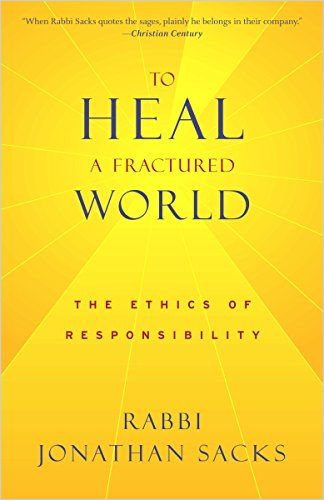“Ethical leadership” requires being accountable, taking moral responsibility, and benefiting others.

The Healing Power of Ethics
Society encourages people to think that morality is a personal choice and individual fulfillment is the meaning of life. But when contemporary people become overwhelmed, they often feel disconnected from societal ills. By contrast, the late Rabbi Lord Jonathan Sacks, an international religious leader, philosopher, and respected moral voice, argues that the connections among people are an important reason that human life is meaningful. He teaches that human dignity requires a sense of collective responsibility, and encourages readers to preserve their ideals while refusing to accept a broken world.
An ethic of responsibility
Modern people often suffer isolation and disconnection. Traditions and institutions that once bound people together have eroded. People search for “self-fulfillment.” Yet, Sacks writes, a life based only on attaining individual desires can never be meaningful. A worthwhile life requires taking responsibility, connecting with other people, and reaching out to improve others’ lives, thereby participating in creating a better world.
In a happy, meaningful life, giving matters more than taking, and serving others has greater value than being served. You will make mistakes, Sacks writes, but you can learn from them. People should work to make the world better, which includes acting with compassion. Human history isn’t over. What happens next depends on what people decide to do now.
A conception of human life without responsibility fails to do justice to human dignity and is no way to ensure our survival as a species.Rabbi Lord Jonathan Sacks
Sacks writes that you don’t need religious faith to ask why evil exists, and good people unjustly suffer. In a purely secular world, billions of independent factors determine the shape of human life.But in Sacks’ faith-based, ethical worldview, God calls on human beings to realize justice on Earth. Faith doesn’t numb people to humanity’s plight. Instead, it calls on them to improve their lives and their world.
Kind actions are a “universal language”
Small gestures toward others can have an enormous impact. To demonstrate, Sacks tells this story: in the mid-1960s, a Black boy and his family moved to a white neighborhood in a big city. The boy worried that his new neighbors would shun his family. Then, one day, a Jewish neighbor stopped as she was driving home, greeted the boy and his brothers warmly, popped into her house, and emerged with sandwiches for them. She acted out of simple kindness. Decades later, this boy, now a Yale professor, still remembers how this moment changed his lifelong outlook. His neighbor’s kind gesture exemplified the universal intrinsic value of benefiting others.
The moral demands on humanity are universal.Rabbi Lord Jonathan Sacks
Many people of all faiths have worked to mitigate the suffering of others around the world. In discussing the responsibilities of moral people, Sacks explains that two great 20th-century rabbis, Ben-Zion Uziel and Abraham Isaac Kook, taught that a person’s moral commitment must be universal. Their lessons include the idea that people should intervene when they see others commit wrongdoing. Those who can prevent a wrong should not just stand by. Though some limits are inevitable, people have a responsibility to one another and to humanity.
The Bible’s drama
Judaism influenced the monotheistic traditions of Islam and Christianity. All three religions imagine a better world, an idea that originates in the Torah, the first five books of the Bible.
Sacks turns to early religious teachings to support his belief that people can make the world more humane and just. The Bible unfolds the drama of human responsibility and search for meaning in four acts. The first act features Adam and Eve in the Garden of Eden, their fall from grace, and their expulsion from paradise. They eat from the tree of knowledge of good and evil and then deny their responsibility. God holds them accountable. This is the origin of ethics.
We are responsible for our character…Moral education is the acquisition of good habits, not just the learning of rules.Rabbi Lord Jonathan Sacks
The second act is the tragedy of Cain and Abel. Cain murders his brother and denies responsibility; he says he’s not his “brother’s keeper.” This story demonstrates the moral imperative of being accountable.
The third act is the story of Noah and the flood. Seen as a righteous man, Noah knew in advance about the flood and yet managed to save only his own family. The story shows that one man’s individual righteousness is important, but not sufficient. Humans must exhibit “collective responsibility.” Being a bystander while others suffer is wrong. The fourth act concerns the Tower of Babel where humans tried to act like God, to build as high as heaven, but they splintered and reaped only disorder and confusion.
Finding meaning
Celebrated psychologist Victor Frankl spent three years in Nazi extermination camps, including Auschwitz and Dachau. He endured, in part, by deliberately becoming an observer of what was happening to him and the other inmates. The Nazis starved and mistreated their prisoners, dehumanizing them by destroying their individuality until the prisoners went numb. Frankl asked a crucial question: When you lose everything, what’s left? He realized that nothing could destroy each person’s ability to help and emotionally support others.
The freedom that remained was the decision how to respond. Frankl survived by constantly analyzing what was happening to himself and others and helping them find a reason to continue to live.Rabbi Lord Jonathan Sacks
Frankl met fellow inmates on the brink of killing themselves. He helped them discover what remained important to them and convinced them they had reasons to survive. One had books to write; another had a beloved daughter abroad he might see again. They each rediscovered hope for a future with unique individual meaning.
Frankl realized that even in catastrophic circumstances, life could be meaningful. His book, Man’s Search for Meaning, says never to regard yourself as merely a victim of fate. Instead, acknowledge that you can understand and interpret what is happening to you from multiple perspectives. As Frankl discovered, even concentration camp inmates could have inner freedom because meaning beckoned to them from outside the walls.
People choose what they do
In Maimonides’ treatise, “The Laws of Ethical Character,” he acknowledged that people may not be able to control aspects of their personalities – such as whether they are serene or prone to anger. However, a person’s ethical character is not predetermined. People can change over time and take control of themselves by choice. For instance, people can mitigate their tendency toward anger by self-consciously behaving in a calm, peaceful way until that becomes habitual.
Responsibility is the solution
Humanity faces overwhelming crises in the 21st century, challenges so enormous it’s hard to imagine what even affluent countries could do about them. Faced with these challenges, people tend to isolate themselves and focus on themselves and their family and friends.
Now, of all times, we should be holding out the hand of friendship to strangers, help to those in need. Power entails responsibility.Rabbi Lord Jonathan Sacks
People fear the world is out of control in ways they can’t address, but that sense of powerlessness puts the world at greater risk. Instead, Sacks counsels, resist the temptation to think you can do nothing. Take responsibility – the strongest weapon against powerlessness. Doing good is a vivid protest against chaos and evil. Small, good actions are lights of hope.
A Valuable Voice
Rabbi Lord Jonathan Sacks was an internationally celebrated moral philosopher and religious scholar. He wrote more than 30 books and contributed to radio, television and the press in Britain and worldwide. As Chief Rabbi of the United Kingdom and the Commonwealth from 1991 to 2013, he became widely known for his levelheaded wisdom, steady faith, and broad knowledge. Sacks died in 2020, just a month after being diagnosed with cancer. Those who study his works (see rabbisacks.org) must often wish he were still present to offer wise counsel about reconciliation and peace in today’s troubled times. Here he argues persuasively for individual accountability and moral action to benefit others. As this dissertation on ethical responsibility clearly demonstrates, even posthumously – thanks to his abundant body of work – Sacks continues to stand out as an ethicist, philosopher, clergyman, educator, and author.







